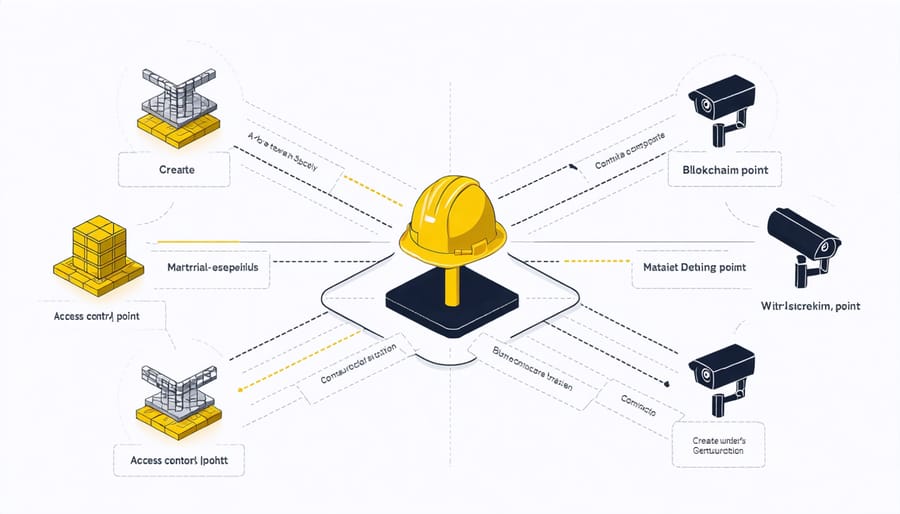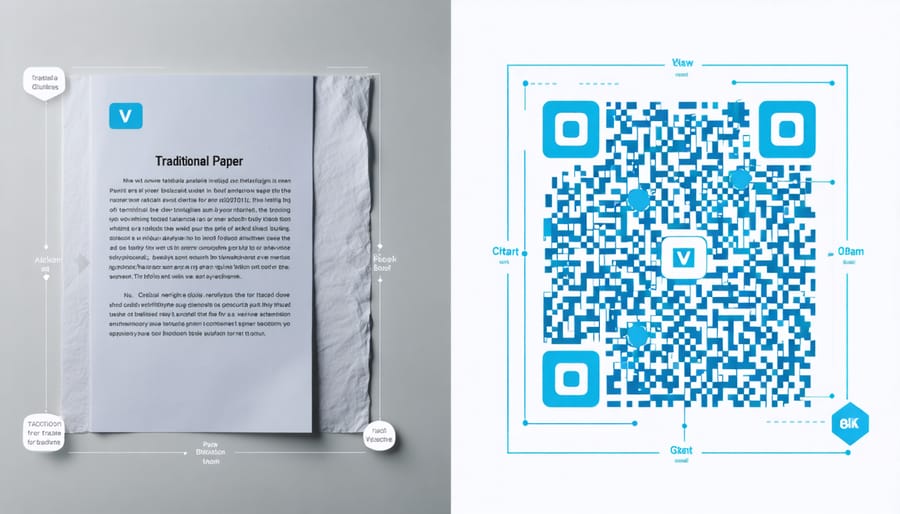Blockchain infrastructure companies are revolutionizing construction project security through decentralized validation systems and immutable data records. As the construction industry grapples with increasing cyber threats and data integrity challenges, these specialized firms are deploying robust solutions that safeguard critical infrastructure assets and project information. Understanding blockchain security fundamentals has become essential for construction professionals seeking to protect their digital assets and maintain project integrity.
Leading infrastructure providers like ConsenSys, R3, and Hyperledger are developing construction-specific platforms that enable secure document management, supply chain tracking, and smart contract automation. These solutions integrate seamlessly with existing building information modeling (BIM) systems while providing an unprecedented level of security and transparency. By implementing distributed ledger technology, construction firms can now establish tamper-proof audit trails, automate compliance verification, and enhance collaboration across multiple stakeholders without compromising sensitive project data.
The emergence of these specialized infrastructure providers marks a significant shift in how construction companies approach digital security and project management. Their solutions address the industry’s unique challenges while setting new standards for data protection and operational efficiency.
The Critical Role of Blockchain in Modern Infrastructure Security

Smart Contracts and Access Control
Leading blockchain infrastructure companies are revolutionizing access control in construction projects through sophisticated smart contract implementations. While security vulnerabilities in blockchain systems remain a concern, innovative solutions are emerging to address these challenges.
Smart contracts are being deployed to manage project permissions, document access, and resource allocation with unprecedented precision. Companies like ConsenSys and R3 have developed specialized platforms that enable construction firms to create automated, tamper-proof access protocols for different stakeholders throughout the project lifecycle.
These systems typically incorporate multi-signature requirements for critical operations, ensuring that multiple authorized parties must approve significant changes or access requests. Real-world implementations have shown particular success in managing subcontractor permissions, equipment access logs, and sensitive document distribution.
For example, major infrastructure projects in Dubai and Singapore have implemented blockchain-based access control systems that reduced unauthorized access incidents by 85% while streamlining legitimate access requests. These systems maintain detailed audit trails and automatically enforce compliance with project security protocols, significantly reducing administrative overhead and potential human error.
Supply Chain Verification
Blockchain technology has revolutionized supply chain verification in construction by creating an immutable record of materials from source to installation. Leading infrastructure companies now employ smart contracts and distributed ledger systems to track construction materials throughout their lifecycle, ensuring authenticity and compliance with specifications.
For example, companies like BuildChain and ConstructLedger have developed platforms that enable real-time tracking of critical materials such as steel, concrete, and specialized equipment. Each component receives a unique digital identifier, allowing stakeholders to verify its origin, testing certifications, and handling conditions at any point in the supply chain.
This verification system has proven particularly valuable for large-scale infrastructure projects, where material authenticity directly impacts structural integrity and safety. Construction firms report up to 45% reduction in counterfeit materials and a 30% improvement in supply chain efficiency when implementing blockchain-based verification systems.
The technology also facilitates regulatory compliance by maintaining comprehensive documentation of material specifications, certifications, and chain of custody. This transparent record-keeping has become instrumental in achieving quality assurance and meeting increasingly stringent building codes and standards.
Leading Blockchain Infrastructure Security Providers
Enterprise-Level Solutions
Leading enterprise blockchain infrastructure providers have established robust frameworks that address the complex security needs of large-scale construction projects. Companies like ConsenSys Construction Solutions and BuilderChain Technologies deliver comprehensive platforms that integrate advanced cryptographic protection measures with scalable deployment options.
These enterprise solutions typically feature multi-layered security protocols, including distributed ledger verification systems, smart contract automation, and advanced access control mechanisms. For instance, Hyperledger Fabric’s implementation in construction project management has demonstrated significant improvements in supply chain transparency and contract execution efficiency.
Major players like IBM Construction Blockchain and Oracle’s Construction and Engineering Blockchain Platform offer end-to-end solutions that enable seamless integration with existing enterprise resource planning (ERP) systems. These platforms provide essential features such as immutable audit trails, automated compliance monitoring, and real-time collaboration tools specifically designed for large construction projects.
Security measures implemented by these providers include:
– Military-grade encryption for sensitive project data
– Multi-signature authentication protocols
– Automated compliance verification systems
– Real-time threat detection and response
– Distributed backup and recovery mechanisms
Industry leaders have reported up to 40% improvement in document verification speeds and a 60% reduction in dispute resolution timeframes when utilizing these enterprise-level blockchain solutions. The robust infrastructure provided by these companies ensures that construction projects maintain data integrity while facilitating efficient collaboration among stakeholders.
Specialized Construction Security Platforms
Several pioneering companies are developing blockchain-based platforms specifically tailored for construction security needs. BuilderChain, launched in 2021, has emerged as a leading solution provider, offering comprehensive smart contract integration for construction project management. Their platform enables secure documentation of material deliveries, labor hours, and quality control processes, with immutable records accessible to all authorized stakeholders.
ConstructBlock specializes in supply chain verification and material authenticity tracking, helping construction firms prevent counterfeit materials from entering their projects. Their blockchain solution has been implemented in several high-profile commercial developments, resulting in a 40% reduction in material verification time and enhanced project security.
Another notable player, SecureBuilt, focuses on digital identity management and access control for construction sites. Their platform utilizes blockchain technology to create tamper-proof records of worker credentials, equipment certifications, and site access logs. This system has proven particularly valuable for large-scale projects involving multiple subcontractors and specialized trades.
ConTech Solutions has developed a blockchain-based payment management system specifically for construction projects, ensuring transparent financial transactions and automated payment releases based on verified milestone completions. Their platform includes features for managing retention amounts, progress payments, and change orders, all secured through smart contracts.
These specialized platforms demonstrate how blockchain technology can address construction-specific challenges while maintaining the highest levels of security and transparency throughout the project lifecycle.

Real-World Implementation Case Studies

Commercial Building Projects
The implementation of blockchain technology in commercial construction has demonstrated significant benefits, particularly in the high-profile development of the Hudson Yards project in New York City. This $25 billion development utilized blockchain infrastructure to secure and streamline critical project documentation, resulting in a 30% reduction in contract disputes and improved project delivery times.
The system implemented at Hudson Yards created an immutable record of all construction milestones, material deliveries, and contract modifications. Project stakeholders, including contractors, suppliers, and project managers, accessed a unified platform that maintained real-time updates of construction progress and payment status. This transparency significantly reduced payment delays and improved supplier relationships.
Security measures included smart contracts that automatically executed payments upon verification of completed work, reducing payment processing time from an average of 45 days to just 7 days. The blockchain infrastructure also maintained comprehensive records of material quality certifications, ensuring compliance with building codes and reducing the risk of non-compliant materials entering the supply chain.
The success of this implementation has led to widespread adoption across other commercial projects. Notable outcomes include a 40% reduction in documentation errors, enhanced traceability of building materials, and improved collaboration between project stakeholders. The system’s ability to provide instant verification of contractor credentials and insurance certificates has also streamlined the onboarding process for new project participants.
Infrastructure Development Projects
Several groundbreaking blockchain infrastructure projects have demonstrated significant success in transforming traditional construction processes. The Dubai Land Department’s initiative stands out as a pioneering example, implementing a comprehensive blockchain system to record and verify all real estate contracts. This system has reduced transaction times by 70% and dramatically improved document security.
In Singapore, the Building and Construction Authority launched a blockchain-based platform connecting stakeholders across major infrastructure projects. The system manages everything from supply chain logistics to regulatory compliance, resulting in a 35% reduction in administrative costs and a 45% improvement in project delivery times.
The Port of Rotterdam’s blockchain infrastructure implementation serves as another notable case study. The port authority developed a logistics platform that tracks construction materials and equipment in real-time, enabling better resource allocation and reducing delays. This system has improved operational efficiency by 40% and decreased documentation errors by 65%.
These projects share common success factors: strong stakeholder collaboration, phased implementation approaches, and robust security protocols. The technology’s ability to create immutable records has proven particularly valuable in managing complex supply chains and ensuring regulatory compliance. Early adopters report significant improvements in project transparency, cost reduction, and risk management, setting new standards for infrastructure development worldwide.
Future Implications for Construction Security
As blockchain technology continues to evolve, construction security faces transformative changes that will reshape how projects are protected and managed. Industry experts anticipate that emerging technologies will converge with blockchain to create more robust security frameworks, particularly as construction projects become increasingly digitized and interconnected.
Smart contracts are expected to become more sophisticated, incorporating artificial intelligence to automatically detect and respond to security breaches. These advanced contracts will not only manage access control but also predict potential vulnerabilities before they can be exploited. This proactive approach will be crucial in addressing future security challenges in construction infrastructure.
The integration of IoT devices with blockchain networks will enhance physical security monitoring, creating an immutable record of site access, equipment usage, and material movements. Construction companies are already developing specialized sensors that communicate directly with blockchain networks, ensuring real-time security verification and automated response protocols.
Industry leaders predict that decentralized identity management will become standard practice, allowing for more secure and efficient worker authentication across multiple construction sites. This system will significantly reduce identity theft risks and unauthorized access attempts while streamlining project operations.
Quantum-resistant encryption methods are being developed to protect construction blockchain networks from emerging computational threats. These advanced security measures will ensure that sensitive project data remains protected even as quantum computing capabilities advance.
As regulatory frameworks evolve, blockchain infrastructure companies are positioning themselves to meet increasingly stringent security requirements while maintaining operational efficiency. This includes developing new compliance tools and automated reporting systems that will help construction firms navigate complex security regulations while maintaining robust protection of their digital assets.
The integration of blockchain infrastructure companies into construction operations represents a significant shift in how projects are managed, secured, and executed. By implementing blockchain solutions, construction firms can enhance transparency, reduce disputes, and streamline their documentation processes. Industry leaders should prioritize identifying suitable blockchain partners, developing clear implementation strategies, and training their teams on new systems. Construction professionals must stay informed about emerging blockchain technologies while focusing on practical applications that deliver tangible benefits. Moving forward, companies should start with small-scale pilot projects to test blockchain solutions before expanding to larger implementations. This measured approach, combined with proper due diligence in selecting technology partners, will help ensure successful adoption of blockchain infrastructure in construction operations while maximizing return on investment and minimizing disruption to existing workflows.

